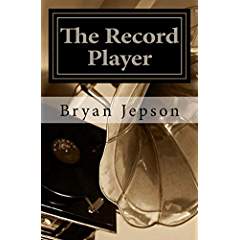 Bryan Jepson’s The Record Player is a new spin (pun intended) on the story of parents who have an autistic child. Music is the leitmotif to the story; indeed, it is the reason the parents of the novel fall in love. Author Bryan Jepson, a father of two autistic children, has spent years doing medical research on autism and supporting others in their needs in dealing with/helping their autistic children. I was not at all surprised to find Jepson a medical expert (on his Amazon author page). His love of classical music is very evident in this book, and in fact, he relies on translating European languages to convey the beauty of music. For me, the translating went a little overboard, but I employed Somerset Maugham’s “fine art of skipping” to get to the next part of the story. I was fascinated to read about how much the group sessions cost the family and what was involved. Gabe is the autistic boy and after a great deal of expense, the family discovers that he calms down when beautiful music is played, learning how to use that interest. But that does not make life with Gabe easy. It seems that life raising a severely autistic child is never easy.
Bryan Jepson’s The Record Player is a new spin (pun intended) on the story of parents who have an autistic child. Music is the leitmotif to the story; indeed, it is the reason the parents of the novel fall in love. Author Bryan Jepson, a father of two autistic children, has spent years doing medical research on autism and supporting others in their needs in dealing with/helping their autistic children. I was not at all surprised to find Jepson a medical expert (on his Amazon author page). His love of classical music is very evident in this book, and in fact, he relies on translating European languages to convey the beauty of music. For me, the translating went a little overboard, but I employed Somerset Maugham’s “fine art of skipping” to get to the next part of the story. I was fascinated to read about how much the group sessions cost the family and what was involved. Gabe is the autistic boy and after a great deal of expense, the family discovers that he calms down when beautiful music is played, learning how to use that interest. But that does not make life with Gabe easy. It seems that life raising a severely autistic child is never easy.
My interest in The Record Player is twofold: in the first case, I studied classical music as a teen: composition as well as singing and playing piano. In the second, I have a sister in law and friend who both have autistic children. The sister in law retired from her job in Saudi Arabia and moved to the USA with the rest of her family in order to help the one child with severe autism.
I loved the scene in the grocery store where Gabe begins singing to Faure’s Requiem. The ending of this book is beautiful and tear jerking. The ending makes the whole book so worth the reading and it gives huge value to the parents’ sense of purpose. (I loved the ending so much I read it twice.) The Record Player is inspiring and I do recommend it to anyone who finds these topics interesting.

 During the last season of Hell On Wheels (spoiler alert!!), in which the Swede (played by Canadian actor Christopher Heyerdahl who, when called a Swede, always replied, “I am from Norway”) was hanged, I was happily immersed in Karen Swensson’s Conversations Loosely Translated, a book in which a brilliant author is able to evoke (literally) the ghosts of her Norwegian forebears. Swensson has done a fabulous job and the ghosts are among the most amenable and interesting of any I have met in book pages or on Halloween.
During the last season of Hell On Wheels (spoiler alert!!), in which the Swede (played by Canadian actor Christopher Heyerdahl who, when called a Swede, always replied, “I am from Norway”) was hanged, I was happily immersed in Karen Swensson’s Conversations Loosely Translated, a book in which a brilliant author is able to evoke (literally) the ghosts of her Norwegian forebears. Swensson has done a fabulous job and the ghosts are among the most amenable and interesting of any I have met in book pages or on Halloween.